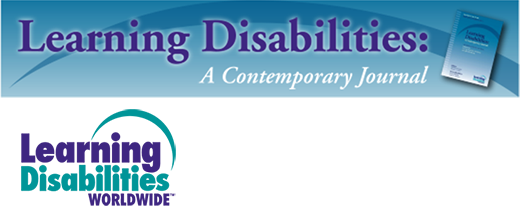Learning Disabilities: A Contemporary Journal (LDCJ) is dedicated to following best practices on matters related to publication ethics and publication malpractice. To ensure that publication ethics are upheld and publication malpractice is prevented, LDCJ follows standards set forth in the Code of Conduct by the Committee of Publication Ethics (COPE). In accordance with the COPE standards, LDCJ addresses the Manuscript Submission and Peer-Review Process, the responsibilities of authors and reviewers, Publication Ethics, and Copyright.
Manuscript Submission and Peer-Review Process
Manuscripts are initially appraised by the first editor-in-chief for conformity to the overall editorial guidelines of LDCJ. Please note that we are not able to consider manuscripts for review unless they fully comply with our submission requirements. If the manuscript is not deemed appropriate for LDCJ, it is returned to the author without further consideration. If it is within the journal's domain but does not meet its requirements for style or quality, the manuscript may be returned to the author for revision before processing can continue. If the manuscript topic and content is deemed to be aligned with the the aims of LDCJ by the Editor(s), manuscripts are sent to two members of the Editorial Board or to expert ad hoc reviewers for blind, peer-review. Every effort will be made to provide a turnaround of 10-12 weeks. However, turnaround times may be longer during certain times of the year (e. g. key academic breaks). Upon completion of the peer-review process, a decision will be made by the first editor-in-chief (“accept as it is”, “accept with minor revisions”, “accept with major revisions”, or “reject”) and the first author will then be notified by email. In all cases, the editors-in-chief reserve the right to make editorial changes that do not materially affect the meaning of the text.
Editor(s) will not disclose any information about a submitted manuscript to anyone other than the corresponding author(s), reviewers, potential reviewers, members of the Editorial Board, and the publisher, as deemed appropriate for review and/or publication purposes.
Authors and Author(s) Responsibilities
Authors submitting manuscripts to LDCJ must affirm that manuscript contents are original and have not been published nor submitted elsewhere. Authors should present an accurate account of research conducted as well as an objective discussion of research results. If asked by the Editor(s) of LDCJ, authors should be able to provide the raw data of their study. Using style guidelines set forth by APA, authors should appropriately cite the work of others and reference any sources of funding or financial support for the research reported.
If authors discover a significant error or inaccuracy in their work, post-review and post-publication, it is the author’s obligation to promptly notify the Editor(s) of LDCJ or publisher to cooperate with the editor and publisher to correct the errors or inaccuracies or issue an erratum.
Reviewers Responsibilities
Reviewers for LDCJ are expected to conduct the review process objectively and should share their thoughts about the manuscript in a clear and objective manner. Reviewers should also provide a thorough review in which they point out any relevant, but not yet cited research to strengthen the manuscript contents. Reviewers that are unable to conduct a prompt and/or objective* review must notify the Editor(s) of LDCJ, in a timely manner, and excuse himself/herself from the review process. Reviewers are expected to treat all manuscripts received for review as confidential documents and the contents of such manuscripts may not be disclosed or discussed with others except the Editor(s) of LDCJ.
*Issues that may interfere with reviewers conducting an objective review may include conflicts of interest such as, but not limited to: (a) financial ties with authors, institutions, and/or companies affiliated with the research under review, (b) collaboration on current or previous projects with the authors, institutions, and/or companies affiliated with the research under review (c) competition with the authors, institutions, and/or companies affiliated with the research under review.
Publication Ethics
Duplicate publication or submission, falsification, plagiarism, fabrication, or research misconduct are considered to be a violation of publication ethics. However, honest errors or honest differences in interpretation or judgment of data are not considered to be misconduct.
When a report of a suspected violation has been sent to us or has otherwise come to the attention of LDCJ Editor(s), corresponding authors will be contacted directly and an explanation will be requested. In such cases, authors may be required to provide the original data. Authors are expected to maintain the original data from their manuscripts for a minimum of three years after the final publication date of their article. In cases where the Editor(s) come to the conclusion that a violation of publication ethics has been committed, they will reserve their right to reject a paper even after it has been accepted or to retract an already published article.
It is presumed that each author of a manuscript has made an important contribution to the study and is thoroughly familiar with the original data. It is also expected that each author has read the complete manuscript and takes responsibility for its content and completeness. By accepting authorship, he or she understands that if the paper, or any part thereof, is found to be faulty or in violation of our editorial policy, he or she shares responsibility with his or her coauthors.
Copyright
Upon publication, all rights, including subsidiary rights, are owned by Learning Disabilities Worldwide (LDW).


